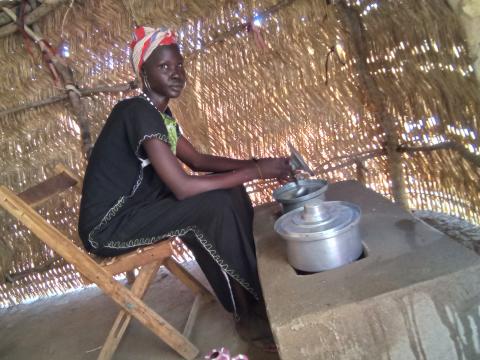South Sudan: Mothers learn about energy saving stove and its benefits to the environment

The majority of households in South Sudan rely on firewood when cooking food. World Vision, through the German Federal Ministry for Economic Cooperation and Development (BMZ) Project, introduced the concept of the fuel-efficient stove as part of climate-smart agriculture. To date, the project trained at least 25 mothers in Manyiel on how to use the stove. These energy-saving stoves use less wood and charcoal, emit little smoke, and pose a lesser risk of fire outbreaks.
Nyanut Achiec Kuol, 28 and a mother of six, lives in Manyiel Village of Aweil East County in Northern Bahr el Ghazal State. She owned a teashop in Manyiel Market, and her husband worked as a community school guard.
“Cooking is one of my daily duties so my children can eat,” Nyanut says.
Most families in Manyiel collect firewood. A few are engaged in charcoal burning.
“When there is no rain, particularly this season, I collect firewood in excess so that during the rainy season, I can light my fire for cooking and warming," she stated, "In addition, we cut trees now so that they dry up for firewood."

“Sometimes, when I don’t have firewood, I use grass, which produces much smoke and poses a risk of burning our house or myself. The smoke also changes the taste of the food,” Nyanut adds.
“Since I received this new stove, I have enjoyed cooking with no smoke. I use five pieces of firewood or charcoal for only SSP150 (USD 0.17) for cooking and boiling water. This support by World Vision greatly reduced the time I spent collecting firewood. Now, I can spend more hours on my tea business and other household demands.”
Climate change is worrisome. Yet it is real. Using locally available materials to reduce fuel consumption can help protect the environment.
Story and photos: ©World Vision South Sudan